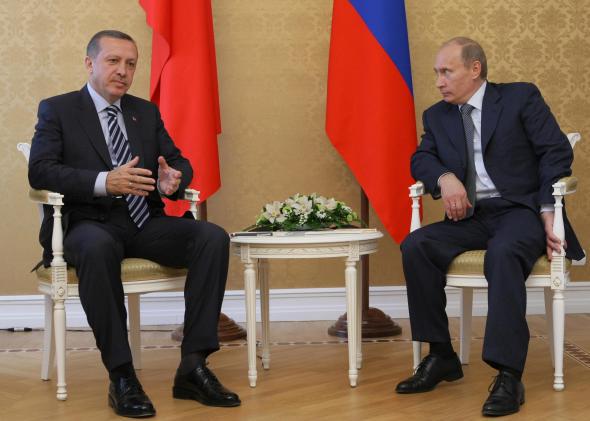Turkey hasn’t had direct control over Crimea since 1783, when the Crimean Khanate, a vassal of the Ottoman Empire, was annexed by Catherine the Great. But because of cultural ties to the region’s Turkic-speaking Muslim Tatar minority, as well as a strategic interest in what’s happening on the other side of the Black Sea, Ankara has been watching the situation closely.
“If the term is appropriate, we are in ‘mobilization’ to defend the rights of our kin in Crimea by doing whatever is necessary,” Foreign Minister Ahmet Davutoğlu said during a visit to Kiev last week where he met with Ukraine’s new government as well as Tatar leaders. Davutoğlu has been active in Crimean affairs before. In 2012 he facilitated talks between Tatar leaders and the Ukrainian government.
While the term “mobilization” may conjure up visions of the Crimean War, when the Ottomans fought Imperial Russia with Britain and France as allies, Turkey’s actual involvement in the crisis is likely to be limited and the government seems to be taking pains to not unnecessarily antagonize Russia.
The two countries have a particularly awkward relationship at the moment. Russia is Turkey’s largest supplier of natural gas, and over the past decade trade between them has increased sevenfold and Vladimir Putin and Prime Minister Recep Tayyip Erdoğan have met more than 30 times.
At the same time, the two are essentially fighting a proxy war in Syria, with Russia as the primary international patron of Bashar al-Assad and Turkey supporting the rebels—although it has backed away from the support a bit recently.
And while there’s still virtually no chance of military confrontation between the two, the fact that the naval power balance in the Black Sea has tipped heavily in Turkey’s favor in the past few years is likely part of the reason why keeping its fleet at Sevastopol is such a priority for Russia.
As Semih Idiz of Al-Monitor writes, Crimea “continues to hold an important part in Turkish nationalist lore” and the permanent reannexation of Crimea by Russia, particularly if there’s any backlash against the Tatars, could be a another political blow for Erdoğan, who has bigger problems on his plate right now. But like the Western leaders he’s allied with on this issue, he’s not really sure what he can do about it.
